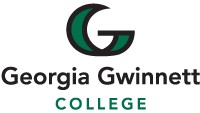With more than 11,000 students and more than 1,000 faculty and staff, the dining hall at Georgia Gwinnett College (GGC) stays busy serving more than 3,000 meals daily. That can add up to a lot of food waste if all those diners don’t clean their plates. One student decided to find a way to repurpose all that organic material, making GGC’s dining operations more sustainable while at the same time providing a teaching tool to students.
Stephen D. Johnson, 28, a senior studying environmental science with a focus in natural science, developed the program he calls “Roots to Shoots” to solve food needs, food waste, and food production issues at GGC. The program takes food waste from the GGC dining hall and uses it for soil compost at GGC’s microfarm, which is used to grow fruits and vegetables for the dining hall and local food banks.
Johnson, a native of Jamaica, who now lives in Duluth, started the program as part of his capstone class project in the fall 2022 semester. It was through knowledge he’s acquired as an environmental science major. He and second-year environmental science student K.J. Hartfield, 23, of Dacula, collect food waste from the dining hall every Tuesday and Friday and take it to the microfarm compost system, where it begins the cycle that will end as fresh fruits and vegetables on meal plates for students and those in need.
He says: “I wanted to bring recognition to Georgia Gwinnett College and its environmental science program by engaging students with a hands-on experience that will equip them for the work world,” said Johnson. “GGC’s mission is to educate and contribute to the community, and with the Roots to Shoots program, it can fulfill this mission through education, sustainable farming practice and community engagement.”
GGC professor of biology Dr. James Russell said Johnson’s program is an excellent example of collaboration between different entities at the college and the local community. He says;
“A local non-profit organization donated the three-bin compost system we currently use at the microfarm, the GGC dining hall has been instrumental in collecting and sorting food waste for the compost system, GGC Fleet Services provide transportation twice a week for movement of food waste to the microfarm, and the GGC Environmental Science Department oversees the compost system and microfarm management. It’s an excellent example of the good that can be done when different areas work together.”
Johnson said the program’s current focus is on soil creation (“the roots”), and future efforts will be to develop sustainable agricultural practices and products (“the shoots”) that will be used for educational, environmental and social outreach. He hopes for Roots to Shoots to be incorporated into the college’s curriculum so that it continues to grow long after he’s graduated.
Johnson said he designed the program to teach students more than how to be self-sufficient. One of its main goals is to also teach them how to become leaders and teachers in their communities by equipping them with practical social science skills such as communication, reasoning and problem-solving, using math and science to find solutions as they work with students and community leaders both on and off campus.
“It’s a program all colleges can adopt,” said Johnson. “I would love to see this system adopted by other institutions so that we can keep this practice going because it’s beneficial to the environment and the people who live in it too.”
Taste of Lilburn will be April 29 at Salem Church
A Taste of Lilburn will be April 29 from 4-7 p.m. at Heritage Hall of Salem Missionary Baptist Church. It is sponsored by the Lilburn Woman’s Club. There will be over 20 restaurants participating. Tickets prior to the event are $10, and can be purchased online at www.TasteofLilburn.org. Tickets at the door will be $15.
GGC’s School of Business earns re-accreditation
 Georgia Gwinnett College’s (GGC) School of Business (SBA) successfully earned re-accreditation through the Association to Advance Collegiate Schools of Business (AACSB), an international accreditation body.
Georgia Gwinnett College’s (GGC) School of Business (SBA) successfully earned re-accreditation through the Association to Advance Collegiate Schools of Business (AACSB), an international accreditation body.
Dr. Tyler Yu, dean of the college’s business school, says: “AACSB accreditation ensures both a high-quality standard of teaching, research, curriculum, and learner success, and a relevancy and impact to the communities the business school serves.”
The accreditation process involves rigorous internal focus. These standards require excellence in areas relating to strategic management and innovation, curriculum and assessment, and community engagement and societal impact. AACSB also reviews faculty qualifications and requires faculty and staff to be active participants in the school’s governance.
GGC joins more than 981 institutions across 60 countries and territories that have earned AACSB accreditation.
Lee is new volleyball coach at GACS
New volleyball coach at Greater Atlanta Christian School (GACS) is Crystal Lee, Athletic Director Tim Hardy announces. She was a GAC varsity assistant coach during the 2022 season, and played an instrumental role for the Spartans’ state championship team. She previously coached at Johns Creek High School from 2019-2021, and she coached club Volleyball at 575 Volleyball and A5 South as well. Lee also played collegiate Volleyball at Georgia State University from 2015-2018.










Follow Us